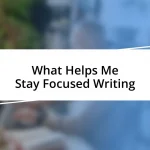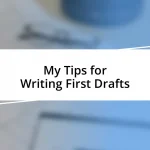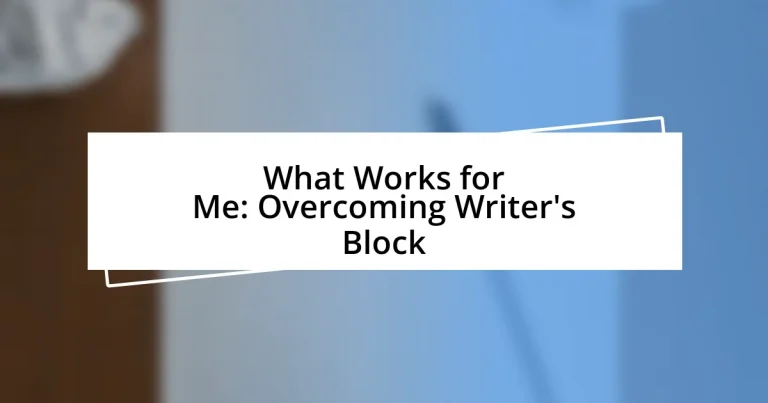Key takeaways:
- Writer’s block can arise from internal fears and external stresses; recognizing triggers like distractions, stress, and perfectionism is crucial for overcoming it.
- Effective techniques to combat writer’s block include free writing, changing environments, and incorporating breaks to rejuvenate creativity.
- Developing a consistent writing routine and setting achievable goals can transform the writing process, making it less daunting and more motivating.
- Using writing prompts and engaging with a writing community can spark creativity and lead to unexpected inspirations.

Understanding Writer’s Block
Writer’s block can feel like a heavy fog descending upon your creative process, making it hard to find clarity. I remember sitting in front of a blank page, staring at my computer screen, my mind racing yet strangely empty. Isn’t it frustrating when ideas just won’t flow, even though you know there’s so much to say?
At times, I’ve realized that this block isn’t just a lack of ideas; it’s often rooted in fear—fear of judgement or failure. When I feel that pressure mounting, it can paralyze my creativity. Have you ever experienced that unease? It’s as if you’re caught in an internal tug-of-war between wanting to write and the fear of what might come out.
Understanding that writer’s block can also stem from external factors has been a game changer for me. Stress from daily life, tight deadlines, or even lack of inspiration can all contribute to that unwelcome halt. The trick, I’ve found, is to acknowledge these feelings and explore how they affect my writing process. What do you think plays a role in your own block?

Identifying Your Triggers
Identifying what triggers your writer’s block can make a significant difference in overcoming it. I’ve often found myself caught off guard by triggers that seemed minor at first. For instance, a noisy environment or an overwhelming to-do list can increase my anxiety and cloud my creativity. Recognizing these specific moments is crucial. By pinpointing what leads to my writing paralysis, I can take proactive steps to address these challenges.
Here are some common triggers I’ve encountered that you might relate to:
– Distractions: Background noise or constant notifications can derail my focus.
– Stress: External pressures—whether personal or professional—can weigh heavily on my mind.
– Perfectionism: The urge to write something perfect often stifles my initial ideas, making it difficult to start.
– Fatigue: Sometimes, I push myself to write when I’m mentally exhausted, which never ends well.
– Isolation: Lack of social interaction can diminish my inspiration and motivation.
Taking time to reflect on your own triggers is like uncovering hidden patterns in your writing journey. Every writer’s experience is unique, and knowing what stalls me might just be the key to unlocking your own creativity.

Techniques to Overcome Blocks
One effective technique I often turn to for overcoming writer’s block is free writing. This method allows me to write without self-judgment, encouraging my thoughts to flow freely for a set period. I recall a time when I felt completely stuck; instead of forcing structured sentences, I simply unleashed my thoughts for ten minutes, and by the end, I had a treasure trove of ideas that surprised me. Have you ever tried that? It’s incredible how it can shift your perspective.
Another strategy that really resonates with me is changing my environment. Sometimes, a simple shift from my usual writing spot to a park or cozy café can reignite my inspiration. I vividly remember a day when I grabbed my laptop and headed outside; the sights and sounds allowed my creative juices to flow. It’s amazing what a breath of fresh air can do for your mindset. Have you experienced a change in scenery that sparked your creativity?
Incorporating breaks into my writing routine has also proven invaluable. I’ve learned that stepping away for just a few minutes can rejuvenate my mind. During one particularly long session, I found myself staring blankly at the screen, feeling defeated. After a quick walk, I returned with renewed energy, and my ideas began to crystallize. It’s essential to remember that sometimes, giving yourself permission to pause is the most productive move you can make.
| Technique | Description |
|---|---|
| Free Writing | Writing without judgment for a set time to generate ideas. |
| Changing Environment | Moving to a different location can spark new inspiration. |
| Incorporating Breaks | Taking short breaks can rejuvenate your creativity. |
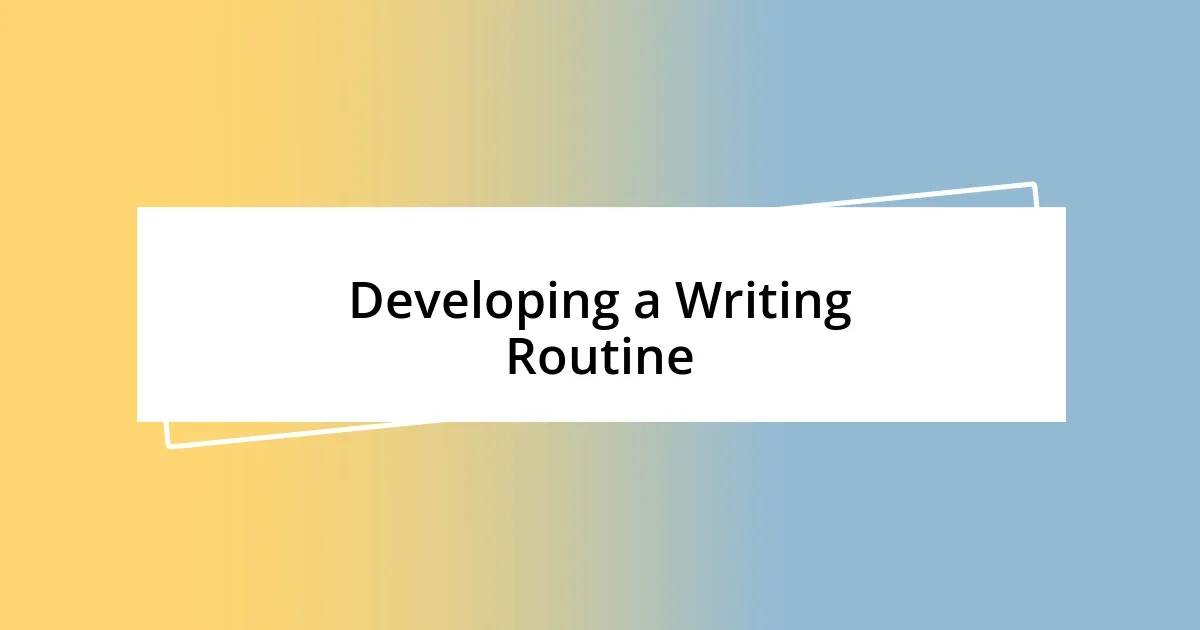
Developing a Writing Routine
Developing a writing routine has been transformative for me. I can’t stress enough how consistency has become my anchor in turbulent seas of creativity. When I set aside specific times each day to write, it’s like training my brain to know, “Hey, it’s time to create!” Have you ever noticed how routines can ease anxiety? I’ve experienced it firsthand; the act of writing regularly removes some of the pressure to create something monumental every time I sit down.
Finding a space that feels right is also essential. I used to write in just any corner of my house, but I realized that my productivity soared when I created a dedicated writing nook. I adorned it with little reminders of my goals, inspiring quotes, and even a plant I named ‘Misty.’ It might sound quirky, but having that personal space shifts my mindset as soon as I enter. Have you thought about how your writing environment affects your mood or productivity?
In my experience, adaptability within the routine plays a critical role as well. Some days, I have energy and can scribble down pages, but on other days, the muse feels distant. I learned to adjust my routine by allowing myself to explore different forms of writing. Instead of pushing myself to finish a chapter, I might spend a day brainstorming ideas or crafting poetry. This fluidity keeps my passion alive. Can you relate to the need for flexibility in your own creative process? Recognizing that I can deviate from my plan without guilt has opened doors to creativity I never thought possible.

Setting Achievable Writing Goals
Setting achievable writing goals is like laying a solid foundation for a house. I remember when I first started writing seriously; I set myself massive targets that felt more like mountains than goals. One day, I realized that breaking those larger aspirations into smaller, manageable chunks made a huge difference. Instead of aiming to write a novel, I focused on completing a single scene or even just a page. This shift not only kept me motivated but also made the writing process feel less daunting. Have you found that smaller goals keep you on track too?
I’ve learned to prioritize quality over quantity. Early on, I would push myself to write for hours, believing that the more I produced, the better I was. However, I found that focusing on the quality of my writing, even in short bursts, led to more satisfying sessions. There were days when I would spend half an hour fine-tuning a paragraph, and it felt absolutely worthwhile. When was the last time you invested in polishing your work instead of just finishing it?
A pivotal moment for me was when I started to celebrate these small victories. After completing a goal, no matter how minor, I would take a moment to acknowledge my achievement, maybe even treating myself to a favorite snack. This habit transformed my writing environment into a positive space, reinforcing my dedication. Have you ever paused to appreciate your progress? It has a way of fueling your motivation and encouraging you to keep going.

Using Prompts to Spark Ideas
Using writing prompts has become one of my go-to strategies for shaking off that dreaded writer’s block. When I sit down and stare at a blank page, the pressure can feel paralyzing. However, I’ve discovered that throwing a prompt into the mix—be it a phrase, a picture, or a random scenario—opens a floodgate of ideas. It’s like giving my mind a little nudge, and suddenly, I’m off on a creative adventure. Have you ever found that just one simple prompt can lead to an entire storyline?
I remember a time when I picked a random word from a dictionary as my writing prompt. That day, the chosen word was “melancholy.” I found myself diving deep into its meaning, tying it to a character’s journey through loss and rediscovery. One prompt led to a passionate exploration of emotions that I hadn’t even realized I wanted to express. It was validating to see how something so small could propel my writing further than I thought possible. Have you tried using random words or phrases in your writing? The results can be surprising.
There’s also something to be said for community in the world of prompts. Participating in prompt challenges with fellow writers has enriched my creative process. I recall an online group that shared daily prompts, each member’s take showcasing unique perspectives. By engaging with their interpretations, I found inspiration I hadn’t expected. It seems like a simple concept, but it really emphasizes how a shared exercise can spark creativity through different lenses. Do you think creativity blossoms in collaboration? It certainly has for me!
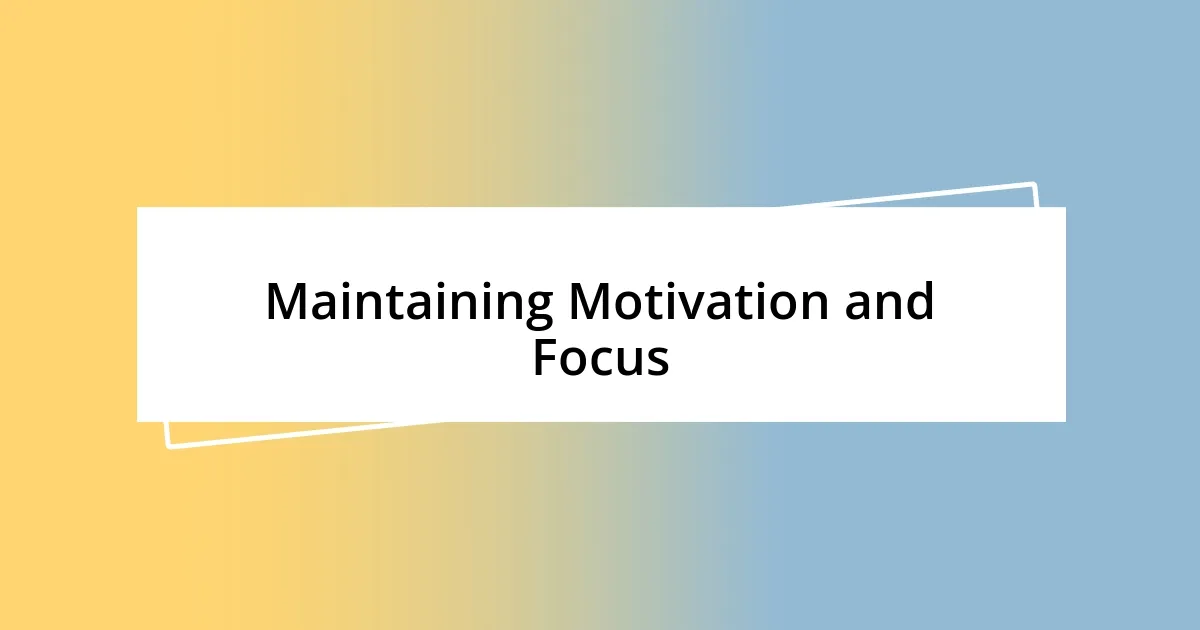
Maintaining Motivation and Focus
Maintaining motivation is one of the hardest aspects of the writing journey. I’ve had days when I simply couldn’t muster the energy to write, and it felt like a brick wall had sprung up in my path. In those moments, I found that creating a dedicated writing space—one that sparks joy and creativity—helps me sink into the right mindset. Have you considered how your environment influences your motivation? It really makes a difference!
I remember a specific time when I was stuck in a rut, grappling with self-doubt. I decided to shift my approach, so I began reading books by my favorite authors for inspiration. Their unique styles reignited my passion and reminded me why I love writing in the first place. After diving into their worlds, I felt a surge of energy that propelled me back to my own desk. Have you ever turned to someone else’s work to reignite your own? It can be such a revitalizing experience.
Another strategy I cherish is establishing a routine that includes breaks designed to recharge my creativity. I often go for walks, listen to music, or even engage in a different hobby for a while. This change of scenery can clear my mind and empower me to return to my writing with fresh perspectives. One afternoon, I found myself brainstorming while cooking, and I ended up jotting down several new ideas during a grease-splattered moment! What about you—do you have a non-writing activity that helps spark your inspiration? It’s remarkable how stepping away can lead to a bastion of motivation once we return.







